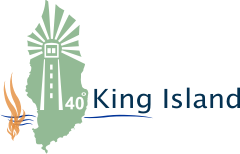|
|

WHO Kelp Industries was registered in 1975.
WHAT A factory and site for receiving, drying and milling stormcast Bull Kelp
(Durvillea Pototorum) For local Australian customers and for export to Scotland & Norway.
HOW
Kelp Supply Self employed suppliers hand select plants cast on
the beaches from predominantly the west coast of the island, deliver them to the
factory site using an assortment of utilities and trailers, trucks etc. They then
hang their Kelp plants using 'S' shaped hooks onto poles placed on racks set at
a conveniently low level.
Weed Storage The Kelp is mechanically lifted from the lower racks
and placed in the higher level racks for storage and atmospheric pre-drying.
Final Drying After about two weeks the air-dryed Kelp is fed into
a wood fired drying system that evaporates sufficient of the residual water to render
the Kelp storage-stable, and brittle for milling.
Milling By means of a purpose-designed system the Kelp is reduced
to its granular form.
Weighing The standard milled product pours into bags each filled
with 1 tonne, with the finer sieved material packed into 20kg bags to be sold
in the local domestic market. Each Kelp supplier has their contribution weighed
separately and is paid on the weight of dry product.
Product Storage The product is held in store pending transfer to
either the standard steel containers in which it is carried in bulk from Currie
to the receiving factories in Scotland, or loaded and shipped to Melbourne
storage to be later sold to our many mainland customers.
Employment Kelp industries gives direct employment to less than ten
people. Many times this number are indirectly involved through collecting
kelp, haulage, etc.
Production Since 1976 the Company has exported in excess of 80,000
tonnes of dried Bull Kelp, this is equivalent to about half a million wet tons.
Exports The majority of production is purchased by ISP Alginates
who are one of the worlds largest producers of Alginates with a 30% market share.
What Are Alginates Alginates occur naturally in most species of
brown seaweed. A chemical extraction process is used to produce purified salts of
Alginic Acid, most often Sodium Alginate. ISP makes about 300 different alginate
products and sells worldwide for thousands of different applications. In one form
or another, it is very likely that you eat, drink, wear or in some manner enjoy
the benefits of our King Island Bull Kelp everday.
|
|
